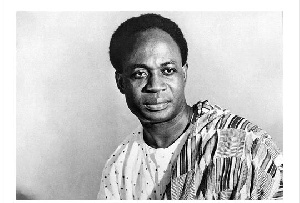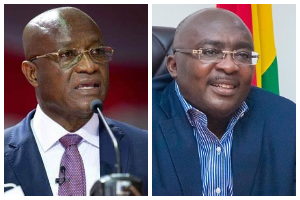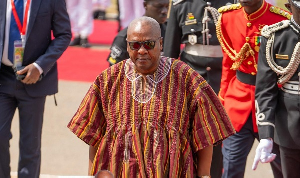"And so what, does it really matter?", " This debate between those journalists is absolutely unimportant and unnecessary.", "Masa, I do not want to listen to their long talk because it brings no coins into my pocket." "Without UGCC, there would be no Nkrumah."
"If Nkrumah is not the founder of this country, then our history would have to be re-written because we have been lied to from KG1 up the educational ladder." This is the reaction of some Ghanaians to the debate regarding who the founder of Ghana really is.
You also have your stance because opinions are like noses and everybody has one. But looking deep into the political history of this country which has had an anaemic growth pattern form the colonial period, through independence till now, who is really the founder - UGCC or Kwame Nkrumah?
For the UGCC, an argument can be made that it was the first political movement which was able to incite and piece together nationalistic feelings in the colony. With its inception in August 1947, they were able to bring elites together to make some powerful demands from the crippling colonial government and demanded the restructuring of the 1946 Burns Constitution which deliberately suppressed local participation, political innovation and representation.
Nkrumahists will also say that after the July 1956 elections, it was Prime Minister Kwame Nkrumah who in August 1956 tabled a motion for independence. And Nkrumah's wish was granted because it passed the then Gold Coast Parliament with a 72 - 0 vote. In fact, they will proudly claim that he was an initiator, advocate and even gave the name Ghana.
The neutralist will not give credit to anyone. She will either say it does not matter or independence couldn't have been realized without concerted effort. She will continue that even after the motion in 1956, the then British Secretary of State, Lennox-Boyd, had to ensure that there was a compromise between the leadership of the CPP (Convention People's Party) and the NLM (National Liberation Movement).
This is because their leaders, Kwame Nkrumah and K. A. Busia for CPP and NLM respectively, did not agree on whether Ghana should be a unitary or federal state. They did not even agree on some provisions of the constitution that was to deliver the Gold Coast its independence.
Interesting. Does everybody have a point but to what ends? It is indisputable that history matter but is it all about the dates and events? If history is about dates and major events, then it has no use. Lessons; that is the essence of history.
We are quick to mention who and what mattered in which event and give accurate dates. But we forget that those events are there to guide our future direction. Events happen everyday but its lessons are to inspire us to do things right and not repeat mistakes. It is not just for memory and superfluous debates.
This is what Dennis Austin, a renowned political scientist, had to say about Ghana after independence. He said that "All colonial Africa looked to Ghana for inspiration, assistance and direction". Can we say same today? Are we developing socially, politically and economically? Do our politicians have us at heart? Are they repeating the mistakes that history has taught us not to commit? In 1960, our GDP was better than that of China but we now borrow from them and lick where they step. It was $183 against $90. What happened?
This is not the time for history classes. It is time to learn from our political and economic history. This is not time for somebody's hate for someone to fuel debates that have no intrinsic and extrinsic value. It is time for us to direct that hate in the right direction and change the course of our progress. For if you hate someone, make sure you are not hated for the same reason of your hate.
Let our leaders learn. Are they really leading us? To where? Let them and us all learn;
1. That pre and post-independence parties, before the first military intervention, were hugely divided concerning who controls state power and resources and that did not help. Our country retrogressed because of that.
2. That the people will revolt and will not care about what happens if they feel cheated by corrupt politicians. If the people become frustrated, they become aggressive. Is it not out of frustration that people and workers become aggressive and demonstrate? Can it not turn into a revolt? Are we any different from the people in Burundi, Central African Republic, South Sudan, Venezuela and others?
3. That if our industrialization is not based on agriculture, the other people will always exploit us. What is the backbone of this economy? It is not unfulfilled promises.
4. That if the politics of the state is right and politicians have us at heart, we will experience significant qualitative and quantitative development.
5. That when the media and journalists get into the pocket of politicians, democracy suffers a huge blow. Consequently, unholy propaganda and subduing of diversified opinions become the order of the day. The media is important because according to the constitution of Ghana (Article 162, clause 5), "All agencies of the mass media ... shall uphold the responsibility and accountability of Government to the people of Ghana." Are they doing that?
6. That if leaders cannot separate their emotions and power drunkenness from positions and resources of the state, unspeakable, horrendous, ludicrous and unreasonable atrocities are committed.
Definitely, there is more. But who cares? If monies of Ghana is at stake and mansions can be built out of it, why care about the market woman in the scorching sun or the unemployed graduate? So-called "developed" countries have no better people.
Their leaders know when to do what and when to avoid what. People made the Arab Spring happen. Genocides and tribal wars were fueled by repeated mistakes from the past. History is our essential guide and nothing less. If we cannot learn from historical events, then we can forget about it altogether.
"Good is not a little bad. It is what it is."
Thomas Brown
brownklann on IG
@tombrownSA
tombrown06brown@gmail.com
Opinions of Friday, 13 April 2018
Columnist: Thomas Brown



















